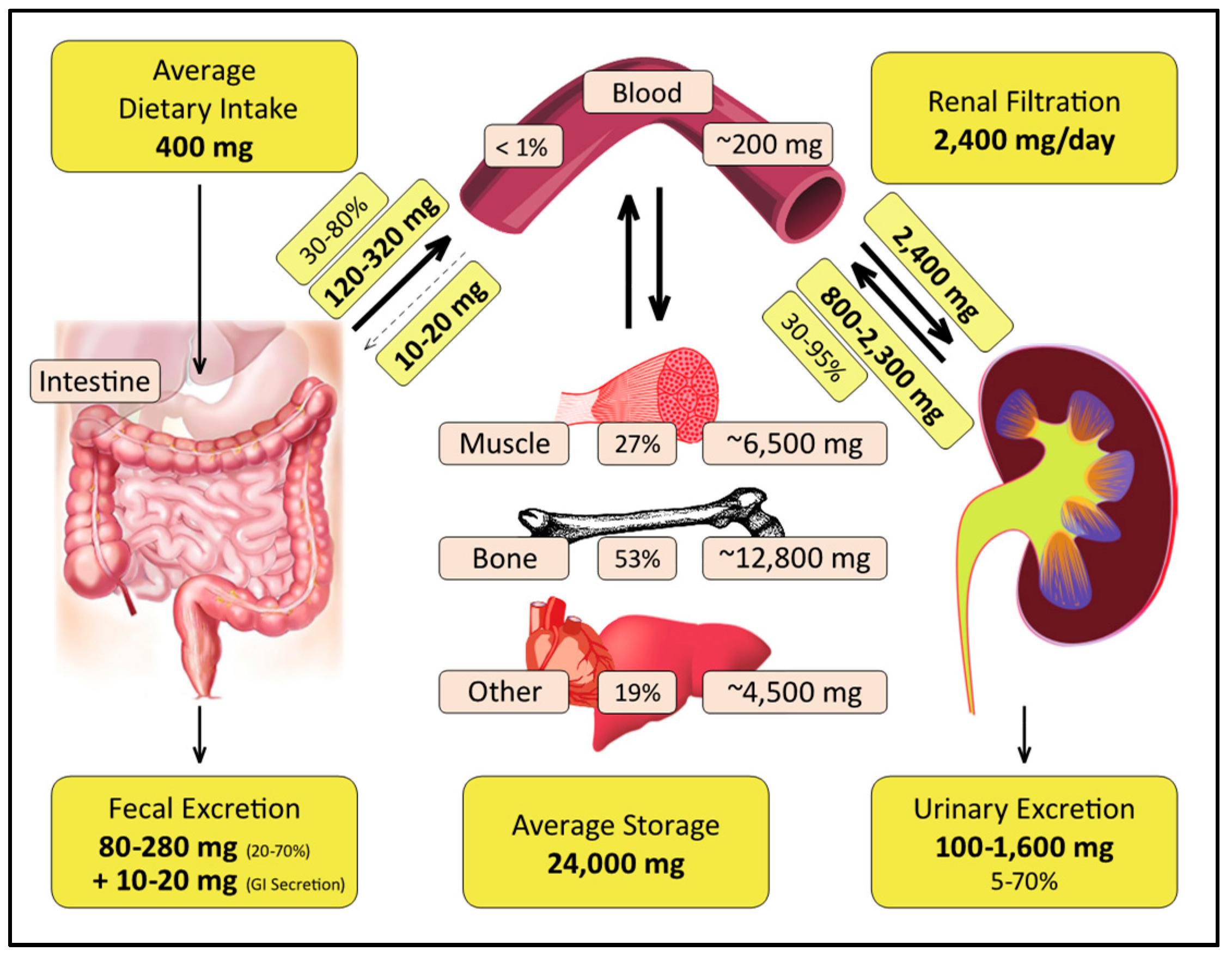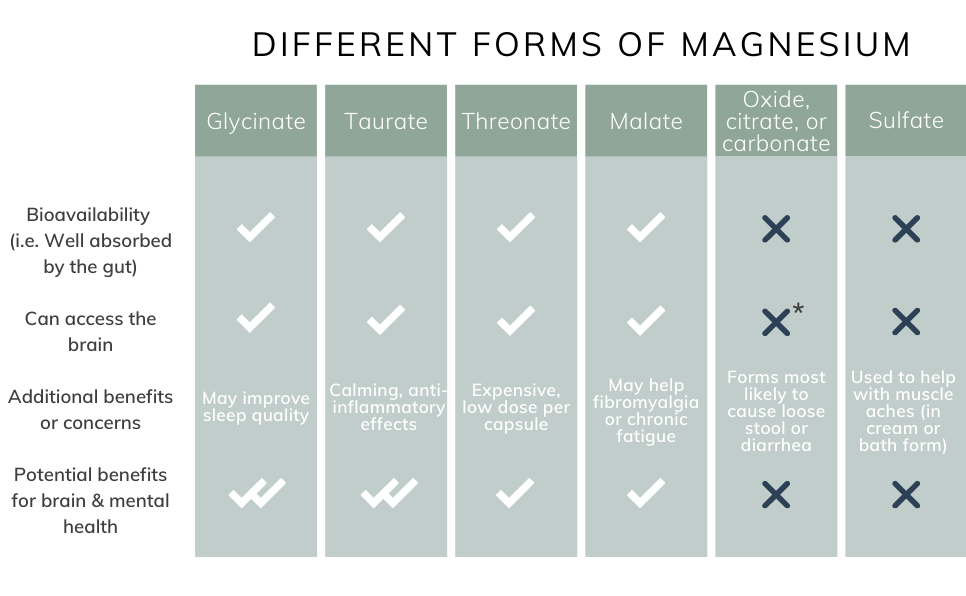Magnesium often goes unnoticed in the health and wellness field. Even though it is the fourth most plentiful mineral in our bodies, many people suffer from magnesium deficiency due to unhealthy eating, stress, medications, and ongoing health issues. Among the various magnesium supplements, Magnesium Glycinate is notable for its excellent absorption and low side effects.
What is Magnesium Glycinate?
Magnesium is a vital mineral for the human body, playing a role in more than 300 biochemical processes. However, many individuals are unaware that they may be deficient in magnesium, which can lead to issues such as fatigue, muscle cramps, sleep disturbances, anxiety, and other problems. One of the best and most easily tolerated types of magnesium supplements is magnesium glycinate.

What is Glycine that Combines with Magnesium?
Glycine is an amino acid that the body does not need to obtain from food, and it has various functions:
- It aids in protein synthesis
- It serves as a neurotransmitter in the central nervous system
- It helps promote relaxation and sleep
- It assists in detoxification by producing glutathione.
Magnesium glycinate, or magnesium bisglycinate, is created by combining elemental magnesium with two glycine molecules. This results in a chelated mineral that improves the body’s ability to absorb and use magnesium efficiently. Chelated minerals like magnesium glycinate are more stable, less likely to cause gut irritation, and are absorbed better in the intestines than non-chelated forms like magnesium oxide or magnesium sulfate.
Benefits of Magnesium Glycinate
Magnesium is a crucial mineral that is involved in more than 300 enzymatic reactions in the human body, which is essential for overall health. One of its main roles is in muscle and nerve function, where it aids in controlling neuromuscular signals and muscle contractions. Additionally, it promotes heart health by keeping a consistent heartbeat, assisting in blood pressure regulation, and supporting the tone of blood vessels. Some other benefits are given below:
Promotes Deep, Restful Sleep
Glycine, an amino acid found in magnesium glycinate, has a soothing effect on the brain. When combined with magnesium, it aids in the creation of calming neurotransmitters such as GABA, which helps you fall asleep more quickly and experience deeper sleep.
Reduces Stress and Anxiety
Magnesium is commonly known as the “relaxation mineral.” It aids in controlling cortisol levels and enhances brain functions that alleviate anxiety. Specifically, magnesium glycinate has soothing effects because of glycine, making it a natural choice for handling stress-related issues.
Supports Muscle and Nerve Function
Magnesium glycinate is beneficial for both athletes and those suffering from chronic pain. It aids in muscle relaxation, decreases cramps, and alleviates tension. Additionally, it is important for nerve signaling, which can be useful for individuals experiencing migraines or nerve pain.
Migraine Prevention
Multiple studies connect low magnesium levels to the occurrence and severity of migraines. Magnesium glycinate might help prevent:
• Aura migraines
• Tension headaches
• Cluster headaches
Because it acts gently on the gut, it does not lead to the diarrhea often seen with other types of magnesium..
Improves Heart Health
Magnesium helps keep blood pressure at a healthy level and supports a regular heart rhythm. Its anti-inflammatory properties also aid in protecting the cardiovascular system.
Improves the Digestive System
Unlike other forms of magnesium that may cause diarrhoea or bloating, magnesium glycinate is well tolerated, making it suitable for daily use, even for individuals with sensitive stomachs.

Bioavailability and Absorption
Magnesium glycinate is notable for its high absorption rate. In contrast to magnesium oxide, which has a bioavailability of only 4%, glycinate provides better uptake, allowing more of the mineral to reach your cells. Additionally, since it is chelated, it avoids competing absorption with calcium or iron, making it appropriate for individuals with complicated supplement routines.
Dosage Guidelines
Magnesium glycinate typically comes in capsules containing 100-200 mg of elemental magnesium each. Most adults usually take 1 to 2 capsules once or twice a day, based on their personal needs and how well they tolerate it. The Recommended Dietary Allowance (RDA) for magnesium differs according to age and gender:
| Group | RDA (mg/day) |
| Adult Women | 310–320 mg |
| Adult Men | 400–420 mg |
| Teens | 360–410 mg |
| Pregnant Women | 350–360 mg |
Best time to take it
Take it 30 to 60 minutes before going to bed to help improve sleep and lessen night-time anxiety or muscle tension. If you are taking medications (like antibiotics), it’s advisable to wait at least 2–3 hours between them to avoid any interactions.
Nutrients That Help Your Body Absorb Magnesium Better
Magnesium is a very important mineral that helps with muscle movement, nerve signals, heart rhythm, and bone health. But your body doesn’t use magnesium all by itself it needs help from other nutrients to absorb and use it properly. Let’s look at the key nutrients that help with magnesium absorption and how they work together in your body.
1. Vitamin D – Helps Your Body Use Magnesium
Vitamin D helps your body absorb magnesium from the food you eat. At the same time, magnesium is needed to activate vitamin D so it can do its job like keeping your bones strong and supporting your immune system.
Why it matters: Without enough magnesium, vitamin D can stay inactive. And without enough vitamin D, your body may not absorb magnesium well either. They work as a team.
2. Vitamin B6 – Helps Magnesium Enter Your Cells
Vitamin B6 helps move magnesium into your body’s cells, especially into your muscles and nerves where it’s most needed. It also helps your body hold onto magnesium so it doesn’t get lost too quickly.
Why it matters: Taking enough vitamin B6 can help your body use magnesium more efficiently, especially during stress or hormonal changes.
3. Calcium – Needs to Be in Balance with Magnesium
Calcium and magnesium work together to control muscle movements. Calcium tightens your muscles, while magnesium helps them relax. If you have too much calcium and not enough magnesium, it can cause problems like muscle cramps or even buildup of calcium in the wrong places (like joints or arteries).
Why it matters: It’s important to keep calcium and magnesium balanced. Most people get plenty of calcium but may need more magnesium to stay in balance.
4. Potassium – Works Together with Magnesium
Potassium and magnesium both help keep your muscles working properly, your heart beating steadily, and your blood pressure at a healthy level. They support each other in many body functions.
Why it matters: If you don’t have enough magnesium, your body may also start losing potassium even if you eat enough of it.
Final Tip
To help your body absorb and use magnesium better, make sure you’re also getting enough:
- Vitamin D (from sunlight, eggs, or fortified foods)
- Vitamin B6 (from bananas, potatoes, and chicken)
- Calcium (from dairy, leafy greens)
- Potassium (from bananas, beans, and sweet potatoes)
Nutrients and Substances That Reduce Magnesium Absorption
While magnesium is essential for many body functions like muscle movement, nerve health, and energy production some nutrients and lifestyle habits can interfere with how well your body absorbs or keeps magnesium. These can either block its absorption in the digestive tract or cause the body to lose more magnesium through urine.
1. Zinc (in High Doses) – Competes with Magnesium
Zinc is an important mineral, but taking large doses (especially over 142 mg per day) may interfere with magnesium absorption. Both zinc and magnesium use the same transport channels in the gut, so too much zinc can “crowd out” magnesium, reducing the amount your body absorbs.
Tip: Balanced intake of both minerals is important. If you’re taking supplements, make sure your zinc dose isn’t too high.
2. Phosphorus – Binds to Magnesium in the Gut
Phosphorus is found naturally in many foods, but it’s especially high in soft drinks, processed meats, and packaged foods as added phosphates. Too much phosphorus can bind to magnesium in the digestive tract, forming compounds that your body cannot absorb. This lowers the bioavailability of magnesium.
Tip: Limit processed foods and sugary soft drinks to reduce excess phosphorus intake.
3. Alcohol – Increases Magnesium Loss
Drinking too much alcohol can reduce the body’s ability to absorb magnesium and increase magnesium loss through urine. Heavy or regular alcohol consumption is one of the leading causes of magnesium deficiency.
Tip: Reduce alcohol intake to protect your magnesium levels and overall health.
4. Caffeine – Can Lower Magnesium Levels
Caffeine, found in coffee, tea, energy drinks, and some sodas, may increase urinary excretion of magnesium, especially when consumed in high amounts. Over time, this can lead to low magnesium levels, especially if your diet doesn’t provide enough magnesium.
Tip: Moderate caffeine intake and balance it with magnesium-rich foods like nuts, seeds, and leafy greens.
5. Diuretics – Cause Magnesium Loss in Urine
Diuretics (also called “water pills”), often used to treat high blood pressure or fluid retention, can cause your body to flush out more magnesium through urine. This includes both loop diuretics (like furosemide) and thiazide diuretics (like hydrochlorothiazide).
Tip: If you take diuretics, your doctor may recommend magnesium testing or supplements to prevent deficiency.
6. Proton Pump Inhibitors (PPIs) – Lower Magnesium Absorption Over Time
PPIs (such as omeprazole or pantoprazole) are medications used to treat acid reflux and ulcers. Long-term use of PPIs can reduce magnesium absorption in the intestines, sometimes leading to dangerously low levels if not monitored.
Tip: If you’re using PPIs regularly, ask your healthcare provider to check your magnesium status.

Side Effects of High Doses of Magnesium (with Focus on Magnesium Glycinate)
Magnesium glycinate is a chelated form of magnesium, bound to the amino acid glycine. It is commonly used for its high bioavailability and low risk of gastrointestinal side effects. Compared to other forms such as magnesium oxide or citrate, it is less likely to cause diarrhea or bowel discomfort. However, like any supplement, it can lead to side effects particularly when taken in excessive doses, or by individuals with underlying health conditions such as renal impairment.
Safety Profile of Magnesium Glycinate
When used at recommended doses, magnesium glycinate is generally safe and well-tolerated. The Recommended Dietary Allowance (RDA) for magnesium from all sources (food + supplements) is:
- Men (ages 19–30): 400 mg/day
- Men (31+): 420 mg/day
- Women (ages 19–30): 310 mg/day
- Women (31+): 320 mg/day
The Tolerable Upper Intake Level (UL) for magnesium from supplements (excluding food sources) is 350 mg/day for adults, according to the National Institutes of Health (NIH). Doses above this level may increase the risk of adverse effects.
Common Side Effects (Typically Dose-Related)
Even though magnesium glycinate has a mild gastrointestinal profile, high doses or individual sensitivity may lead to:
- Nausea
- Abdominal cramping
- Soft stools or mild diarrhea (less common than with citrate or oxide)
- Drowsiness or sedation (due to the glycine component, which has calming effects)
- Headaches or muscle weakness (in rare cases, possibly due to electrolyte shifts)
These effects are typically mild and resolve with dose adjustment or administration with food.
Serious Side Effects from Excess Magnesium
Excessive intake of supplemental magnesium especially above 350 mg/day in addition to dietary intake can lead to magnesium toxicity, particularly in individuals with compromised renal function, as the kidneys are primarily responsible for excreting excess magnesium.
Symptoms of Magnesium Overdose (Hypermagnesemia) include:
- Hypotension (low blood pressure)
- Bradycardia (slow heart rate)
- Lethargy, confusion, or altered mental status
- Muscle weakness or flaccid paralysis
- Depressed or slowed breathing
- Cardiac arrhythmias
- In severe cases: cardiac arrest or coma
Note: These outcomes are typically only seen with very high intakes (>1,000 mg/day from supplements) or in patients with kidney dysfunction who cannot excrete excess magnesium effectively.
Drug Interactions and Special Populations
Certain medications and medical conditions can affect magnesium metabolism or increase risk of side effects:
At risk groups:
- Individuals with chronic kidney disease (CKD)
- Elderly adults (reduced renal clearance)
- People on magnesium-containing laxatives or antacids
Potential interactions:
- Diuretics (e.g., furosemide, hydrochlorothiazide): may increase urinary magnesium loss.
- Antibiotics (e.g., tetracyclines, fluoroquinolones): magnesium can bind these in the gut, reducing drug absorption.
- Calcium channel blockers: additive effects on neuromuscular or cardiovascular function when magnesium is elevated.
- Proton pump inhibitors (PPIs): Long term use has been associated with hypomagnesemia, and supplementation should be monitored.
Clinical Recommendations
- Start with low to moderate doses (100–200 mg elemental magnesium daily) if supplementation is needed.
- Do not exceed 350 mg/day from supplements without clinical guidance.
- Take with meals to enhance absorption and reduce GI discomfort.
- Monitor renal function before initiating long term magnesium therapy, especially in older adults or those with hypertension, diabetes, or known kidney disease.
Allergic Reactions caused by Magnesium Glycinate
Allergic reactions to magnesium glycinate are rare, they can occur, particularly in individuals with sensitivities to magnesium compounds or to certain inactive ingredients used in supplement formulations.

Possible Allergic Reactions
Though magnesium itself is a naturally occurring mineral and generally not allergenic, some people may develop allergic reactions or hypersensitivity responses, especially if:
- They have a pre-existing sensitivity to magnesium salts.
- The supplement contains inactive ingredients such as:
- Fillers (e.g., lactose, cellulose)
- Binders
- Preservatives
- Artificial colors
- Gelatin (in capsules)
Signs of a Possible Allergic Reaction
If an allergic or hypersensitivity reaction occurs, symptoms may include:
- Skin rash or hives
- Itching or swelling (especially on the face, tongue, or throat)
- Dizziness or lightheadedness
- Difficulty breathing or wheezing
- Gastrointestinal upset (less commonly allergic in nature)
These symptoms may signal a serious allergic reaction (anaphylaxis) and require immediate medical attention.
Distinguishing the Cause
It’s important to distinguish whether the adverse reaction is due to:
- Magnesium glycinate (active ingredient)
- Other ingredients in the capsule
- A coincidental exposure to another allergen or drug interaction
In most reported cases, the allergic response is related to additives or impurities, especially in non certified, low quality supplements.
Recommendation: Choose products that are:
- Third-party tested (e.g., USP, NSF certified)
- Free from known allergens (gluten, soy, dairy, etc.)
- Free from artificial colors, preservatives, and unnecessary excipients
Conclusion
Magnesium glycinate is not just another supplement it’s a gentle powerhouse for mental calm, restful sleep, muscle health, and hormonal balance. Whether you’re facing stress, having muscle problems, or just looking to improve your wellness, this highly absorbable form of magnesium provides a safe and effective solution. As with all supplements, consistency is important. Consult your healthcare provider to customize your magnesium intake to your individual needs. With proper guidance and dosage, magnesium glycinate can be a vital part of your path to better health.
FAQ’s
1. What makes magnesium glycinate superior to other magnesium types?
Magnesium glycinate is bonded with the amino acid glycine, which enhances its absorption and makes it easy on the stomach. Unlike other types, it usually doesn’t lead to diarrhea, making it suitable for long-term use and for individuals with sensitive digestive systems.
2. Can magnesium glycinate assist with anxiety and stress?
Yes! Both magnesium and glycine have soothing effects on the nervous system. Magnesium glycinate aids in the production of GABA, a neurotransmitter that helps alleviate anxiety, encourage relaxation, and stabilize mood.
3. Does magnesium glycinate aid in sleep?
Definitely. Magnesium glycinate is commonly used as a natural sleep aid. It encourages deep, restful sleep by soothing the nervous system, relaxing muscles, and balancing melatonin and cortisol levels.
4. Is magnesium glycinate safe for everyday use?
Yes, it is safe for most individuals when taken in the recommended amounts. Due to its gentle formulation, it is less likely to cause side effects such as diarrhea or cramping compared to other magnesium forms.
5. Who should steer clear of magnesium glycinate supplements?
People with kidney issues, heart block, or those taking certain medications (like diuretics or antibiotics) should check with their doctor before using magnesium glycinate, as incorrect magnesium levels can be dangerous.
6. How long does it take to notice the effects of magnesium glycinate?
Some individuals notice better sleep and less anxiety within a few days, while others may experience benefits like muscle relief or mood improvement after 2–4 weeks of regular use.

 Medically reviewed by
Medically reviewed by